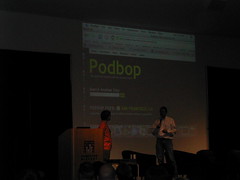One of the core tenets upon which RedMonk was founded was that context matters. A lot. Mashup Camp was, in my view, an excellent reminder of this belief. For example, my feedback from day one of the show drew criticism from my colleague, who believes that my signal to noise comment was potentially insulting to our regular audience. And in a hallway conversation, ZDNet’s Steve Gillmor indicated that he didn’t share my belief that this was one of the better conferences in a while, if not ever.
But it’s a question of context, I think. My opinions of the show, and its value, cannot be divorced from it. As has been covered any number of times before, the most important constituency for me to track is the developer community, and Mashup Camp was a camp all about developers. Developers provided the content, developers set the agenda, and developers competed for the rights to a tricked out Sun server.
Is this the perfect conference format for everyone? Absolutely not. But for me, it was ideal. I was free to wander around, chatting with some of the best and brightest within the development community – with no barriers. Want to talk to Chicagocrime.org‘s Adrian Holotavy? Pull up a chair. Want to hear about what Mashup Camp’s Grand Prize winner, Taylor McKnight, built his application on? Just ask.
So while I’m sure that many will have their opinions on what Mashup Camp got right or wrong, not to mention its ultimate value, I’m with Jonathan Schwartz: I personally hope this is the future of trade shows, because it prioritizes the voices of the constituency that I care most about – the developers. YMMV, as always.
Other news & notes from the show:
- I was going to bring you summaries of the highlights from the ‘speedgeeking’ portion of the show, but Dan Farber’s already done that here.
- Of the mashups, which were my favorites? Well, I did think Taylor and Daniel Westermann-Clark’s Podbop.org (Perl) winner was pretty cool, but Adrian’s second place Chicagocrime.org (Django/Python/Postgres/PostGIS) got my nickel. What he’s done with that site is remarkable, and there’s more on the way. In addition, to those two, I liked David Schorr’s Weatherbonk.com/Skibonk.com (Java) and travel services Flyspy and TrainCheck. I’m almost certain to also be trying out Eventful’s iTunes to calendar synchronization service.
- Any other posts of interest? Tons – just hit one of the blog search engines. But in the meantime, check out the wrapups from the folks I had dinner with yesterday: FeedLounge’s Alex King and Sharpcast’s (looks awesome) Adam Tow. As an aside, Adam took the time to demo some of the Newton functionality for me yesterday – yes, that Newton – and it’s amazing how ahead of its time that device was. Linking the calendar with notetaking with contacts? I can’t do that on my desktop.
- Language preferences: the lack of Ruby apps was notable.
Apart from Eventful, I don’t know that there was another Ruby app in houseEventful is apparently not done in Ruby on Rails, but John Herren’s very cool mastrbeta.com is a Rails app. The informal results said that PHP led the pack with a reported 12 applications, Perl checked in with 4, 2 in JavaScript (as if that wasn’t in most?), and 2 in – surprise, surprise – C++. As reported below by Adrian, Python checked in with at least 3 applications of its own – Chicagocrime, traincheck, and Attendr. Again, the results are entirely unofficial not to mention statistically irrelevant, but still interesting. - Someone on Day 1 had reported that there were in total (as I understood it – correct me if I’m wrong – maybe there was a qualifier I missed) 160 APIs available for consumption by mashups; that number seems insanely low to me. eBay alone claimed that they had over a 100, so I’m not really sure where they came up with that figure.
- Monetization: I mentioned briefly yesterday that selling the application was not the only way to monetize the efforts behind these mashups, and yesterday confirmed it. I personally witnessed four separate “interviews” of developers during the conference, and I’m sure there were tons that I didn’t see.
To wrap up, it was a show well worth the trip and I look forward to attending the next iteration (hopefully, with later start times), whever it might be. From the signup page there, it seems as if most of the attendees of Mashup Camp 1 feel the same way.
Update: Couple of corrections/updates:
- Fixed a couple of rather egregious typos
- Updated/corrected some of the language information

